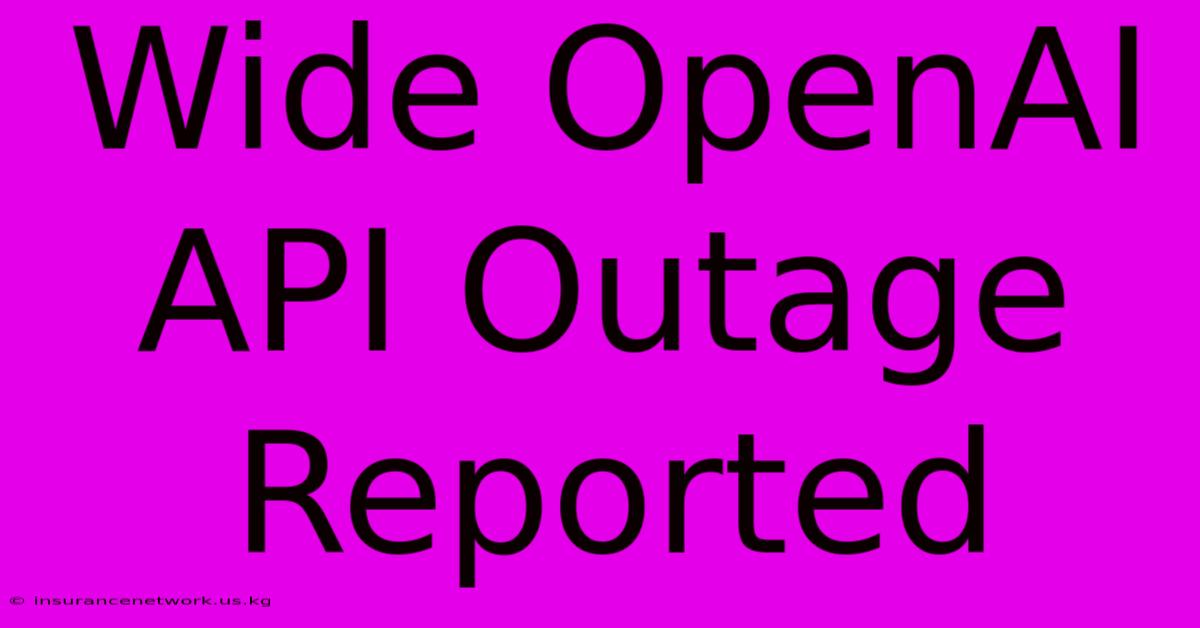Wide OpenAI API Outage Reported

Discover more detailed and exciting information on our website. Click the link below to start your adventure: Visit Best Website insurancenetwork.us.kg. Don't miss out!
Table of Contents
Wide OpenAI API Outage Reported: What Happened and What to Expect
A significant outage affecting the OpenAI API was recently reported, causing disruptions for numerous applications and services reliant on its powerful language models. This incident underscores the critical dependence many businesses and developers have on these APIs and highlights the importance of understanding potential disruptions and mitigation strategies.
Understanding the OpenAI API Outage
The outage, which lasted for [Insert Duration Here], impacted access to various OpenAI API endpoints, resulting in errors and service unavailability for users. While the precise cause hasn't been officially detailed by OpenAI (as of this writing), reports suggest [mention speculated causes, e.g., high traffic, server issues, or a potential infrastructure problem]. The lack of immediate transparency during the outage fueled concerns amongst developers who rely on the API for their projects.
Impact on Users and Developers
The widespread disruption caused significant problems for many:
- Application Downtime: Many applications utilizing OpenAI's API experienced complete or partial downtime, leading to frustrated users and lost productivity. This impacted everything from chatbots and content generation tools to more complex AI-driven systems.
- Project Delays: Developers working on projects dependent on the OpenAI API faced delays, potentially impacting deadlines and overall project timelines.
- Revenue Loss: Businesses utilizing the API for customer-facing services likely experienced revenue loss due to service interruptions.
- Reputational Damage: For companies whose services were disrupted, the outage could have negatively impacted their reputation and user trust.
What OpenAI Should Do to Prevent Future Outages
While OpenAI likely has robust internal processes, this outage highlights the need for even greater resilience and transparency:
- Improved Infrastructure: Investing in more robust and scalable infrastructure is crucial to prevent future outages. This might involve geographically distributed servers, improved load balancing, and enhanced fault tolerance mechanisms.
- Real-Time Monitoring and Alerting: A more sophisticated monitoring system with real-time alerts would allow OpenAI to detect and respond to potential issues much faster.
- Proactive Communication: Clear and timely communication during an outage is essential. OpenAI should provide regular updates to affected users, outlining the problem, the steps being taken, and an estimated time of restoration.
- Improved Documentation and Support: Comprehensive documentation that details potential issues and provides troubleshooting guidance is vital. Enhanced support channels can help developers navigate difficulties during disruptions.
- Redundancy and Failover Mechanisms: Implementing robust redundancy and failover systems is key to ensuring continuous service even if one part of the infrastructure fails.
Lessons Learned and Best Practices for Developers
Developers who rely heavily on the OpenAI API should consider these best practices:
- Implement Error Handling: Robust error handling in your applications can help minimize the impact of API outages. This includes gracefully handling network errors and providing alternative solutions when the API is unavailable.
- Diversify API Usage: Consider using multiple AI providers or developing fallback mechanisms that don't rely solely on the OpenAI API. This diversification mitigates risk.
- Regular Testing and Monitoring: Regularly test your application's resilience to API outages through simulated downtime scenarios. Monitor your API usage and performance to identify potential issues before they escalate.
- Caching Strategies: Implementing caching strategies can significantly reduce the reliance on the OpenAI API during peak usage or outages, providing a smoother user experience.
The Future of OpenAI and API Reliability
The recent OpenAI API outage serves as a crucial reminder of the inherent risks associated with relying on third-party services. While OpenAI provides a powerful platform, maintaining service reliability is paramount. By addressing the lessons learned from this incident, OpenAI can significantly improve its service resilience and build greater trust with its users. For developers, proactive measures and diversification are key to mitigating the impact of future outages. This incident should encourage a more robust and resilient approach to AI application development.

Thank you for visiting our website wich cover about Wide OpenAI API Outage Reported. We hope the information provided has been useful to you. Feel free to contact us if you have any questions or need further assistance. See you next time and dont miss to bookmark.
Featured Posts
-
New Chinese Fighter Jet In Flight Test
Dec 27, 2024
-
Retailers Post Holiday Sales
Dec 27, 2024
-
Premier League Stadiums Past 4 Decades
Dec 27, 2024
-
Teddy Bridgewater Back With Lions
Dec 27, 2024
-
Miami Coach Larranaga To Retire
Dec 27, 2024
